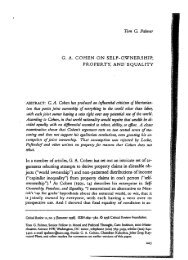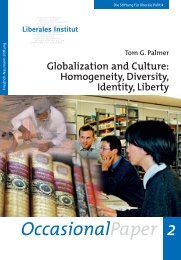Are Patents and Copyrights Morally Justified? - Tom G. Palmer
Are Patents and Copyrights Morally Justified? - Tom G. Palmer
Are Patents and Copyrights Morally Justified? - Tom G. Palmer
You also want an ePaper? Increase the reach of your titles
YUMPU automatically turns print PDFs into web optimized ePapers that Google loves.
846 HarvardJournal of Law & Public Policy [Vol. 13<br />
the back, etc.), indicates that the work enjoys at least an intersubjective<br />
availability. We do not say that we went to two different<br />
performances, nor that we heard two different sonatas,<br />
simply because our perceptions (or impressions) were not entirely<br />
the same. The objectivity ofShakespeare’s Othello consists<br />
in precisely this: that there is one Othello for all of us, rather<br />
than one Othello for each of us, or even one for each of our<br />
separate readings or viewings of the play.” 6<br />
Each separate performance of Othello is a real event, <strong>and</strong> as<br />
such is governed by property rights (the rights of self-ownership<br />
of the actors, the property rights of the theater owners,<br />
etc.), while Othello itself is neither a real event nor a real object.<br />
While the work ofart does indeed originate in a definite time,<br />
as Ingarden riotes:<br />
not everything which originates in a definite time must<br />
therefore be something real. . . , Every real object <strong>and</strong> every<br />
real event is, above all, something which exists or takes place<br />
hic et nunc. But. . . the categories ofhere <strong>and</strong> now cannot be<br />
applied to the musical work <strong>and</strong> its content. . . . What is it<br />
supposed to mean, for example, that Beethoven’s sonata,<br />
Qpuc 13, is ‘here’? Where is ‘here’?” 7<br />
The sameness, intersubjectivity, <strong>and</strong> objectivity of the work<br />
are intimately related. Without a manifold of appearances—like<br />
presentations <strong>and</strong> interpretations—the work cannot appear to<br />
us as “the same”; without appearing to us as the same, it cannot<br />
be intersubjective; <strong>and</strong> without intersubjectivity, it cannot<br />
be objective. In the dialectic ofsame <strong>and</strong> other, we cannot have<br />
the former without the latter; we cannot have “same” without<br />
“other.” Thus, we cannot have the sameness ofa work ofart<br />
116. This is what accounts for thenon-rivalrous nature of theconsumption ofworks<br />
of art <strong>and</strong> other ideal objects; their enjoyment by one person need not diminish their<br />
enjoyment by another. This also shows the difference between the concretion of a<br />
work, like a performance, <strong>and</strong> the work itself. My enjoyment of a performance may<br />
diminish your ability to enjoy the same performance, perhaps because I block your<br />
view, but it does not exhaust or in any way diminish thework itself. It is for this reason<br />
that ThomasJeffersondenied anynatural property right in ideal objects: “Ifnature has<br />
made anyone thingless susceptible than allothers ofexclusiveproperty, it is theaction<br />
of the thinking power called an idea, which an individual may exclusively possess as<br />
long as he keeps it to himself; but the moment it is divulged, it forces itselfinto the<br />
possession of every one, <strong>and</strong> the receiver cannotdispossess himself of it. Its peculiar<br />
character, too, is that no one possesses the less, because every other possesses the<br />
whole of it. He who receives an idea from me, receives instruction himself without<br />
lessening mine; as he who lights his taper at mine, receives light without darkening<br />
me.” Jefferson, Letter to Isaac McPherson, Monticello, August 13, 1813, in XIII THE WRIT-<br />
INGS OF THOMAS JEFFERSON 826-88 (A. Lipscomb ed. 1904).<br />
117. R. INGARDEN, ONTOLOGY OF THE WORK OF ART 85.86 (1989).











